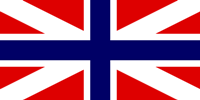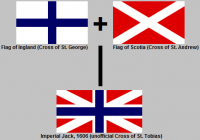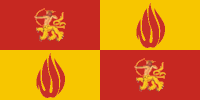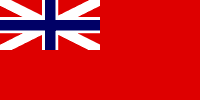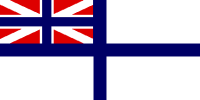Difference between revisions of "Flag of Inglo-Scoita"
Inglo-Scotia (Talk | contribs) m (moved Flag of Inglo-Scoita to Flag of United Empire of Inglo-Scotia over redirect) |
Inglo-Scotia (Talk | contribs) m (moved Flag of United Empire of Inglo-Scotia to Flag of Inglo-Scoita over redirect) |
(No difference)
| |
Latest revision as of 18:44, 10 June 2011
The flag of the United Empire of Inglo-Scotia, sometimes called the Imperial Jack or the Cross of St. Tobias, was adopted in 1607 by Emperor Tobias I to reflect the newly united Empire of Ingland and Scotia.
The flag's design features the flag of the Kingdom of Ingland, a blue Cross of St. George on white, super-imposed on the design of the flag of the Kingdom of Scotia, a white Cross of St. Andrew on red. The flag has unofficially been called the Cross of St. Tobias, named after Emperor Tobias I, who would later be canonized by the Inglo-Scotian Communion Church.
Variants
The blue ensign is the designated civil ensign for of the United Empire. It's flown by civilian ships.
The red ensign is the designated government ensign. It's flown by non-military government ships.
The Imperial Navy uses the white ensign as its ensign. The flag is the blue Cross of St. George with the Imperial Jack occupying the canton.
The Imperial Army uses a red ensign defaced with crossed swords as its flag.
The Imperial Air Force uses a sky blue ensign as its flag.
The Imperial Armed Forces use a square variant of the Imperial Jack as a roundel on military vehicles.
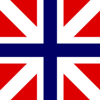
Ceremonial Flag
A ceremonial variation of the Imperial Jack exists, defaced with the Imperial coat of arms.
Imperial Standard
The Imperial Standard of the United Empire serves as the personal flag of the Emperor or Empress, currently Andrew III. It's based on the coat of arms of the United Empire, combining the lion-centaur archer of the Inglish monarchy with the flame of the Scotian monarchy.
